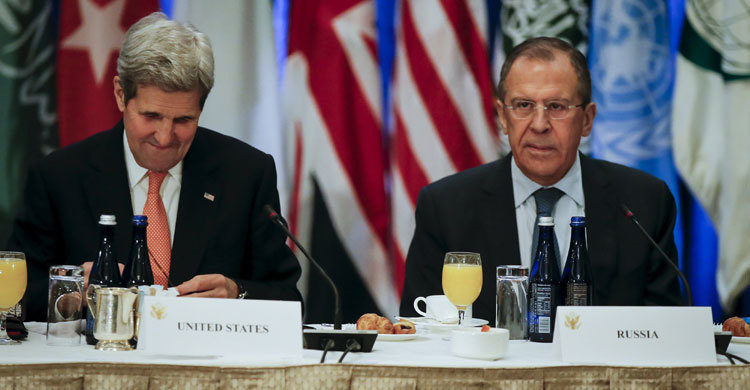U.N. Security Council approves plan for Syrian peace process

The U.N. Security Council on Friday unanimously approved a resolution endorsing a peace process that is designed to end Syria’s civil war and to allow the international community to focus its attention more fully on defeating the Islamic State.
‘This council is sending a clear message to all concerned that the time is now to stop the killing in Syria and to lay the groundwork for a government that the long-suffering people of that battered land can support,’ Secretary of State John F. Kerry said of the initiative.
But although the resolution gave Security Council backing to an 18-month process for negotiations between the Syrian government and its opponents to establish a cease-fire and negotiate the parameters of a transitional government, write a constitution and hold elections, it turned implementation over to the United Nations.
The agreement made no mention of the future of Syrian President Bashar al-Assad.
Kerry nonetheless described it as a major step toward resolving the Syrian conflict, a goal that has eluded the countries backing the opposing forces on the ground for more than four years.
The resulting chaos has allowed the Islamic State to step in and occupy wide swaths of Syria and neighboring Iraq.
For the first time, Kerry said, a political track has been agreed by Assad’s allies — Russia and Iran — and the United States and its partners in Europe and the Middle East who support the Syrian opposition trying to overthrow him.
There is, he said, a ‘clarity about the steps that need to be taken’ and ‘a timeframe.’
‘Nobody is sitting here today suggesting that the road ahead is a gilded path,’ Kerry said at a news conference after the vote.
The resolution instructs U.N. envoy Staffan de Mistura to guide the Syrian government and opposition groups toward negotiations to begin as early as next month.
Among the pitfalls he will have to navigate are opposition insistence that no talks can be held with Assad’s participation and Russia’s demand that he be included in the negotiations.
The two sides also disagree about which opposition groups can be included in the negotiations, with Russia seeking to ban as ‘terrorists’ Islamist forces that are among the strongest and most numerous opposition fighters.
‘I’m not too optimistic about what has been achieved today,’ said Russian Foreign Minister Sergei Lavrov, who sat at Kerry’s side during the news conference.
‘The progress has not been as dramatic as we would like it to be. . . . But it is complicated.’
Kerry indicated that passage of the resolution, assuming its provisions begin to be implemented, could lead to more coordination between the United States and Russia on airstrikes against the Islamic State.
‘Now that we have a U.N. resolution. . . and a process moving,’ he said, ‘the door is much more open. . . for us to consider greater ways of cooperation.’
The Security Council vote came after more than five hours of separate talks Friday among a group of more than a dozen nations, the International Syrian Support Group, to hammer out the terms.
First convened by Kerry two months ago, and including countries backing all sides of the conflict, the group has been propelled by shared concern over the growing humanitarian crisis in Syria, refu¬gee flows to Europe, and shared anxiety over the growing strength of the Islamic State, including recent terrorist attacks it has sponsored or inspired in Europe, the United States and elsewhere.
But while the group agreed a political solution had to be found, it has faltered on the terms. The resolution appeared to paper over many of the members’ differences in the interests of starting a process that Kerry has said he hopes will take on its own momentum and propel compromise among the disparate Syrian and foreign actors fueling the war.


